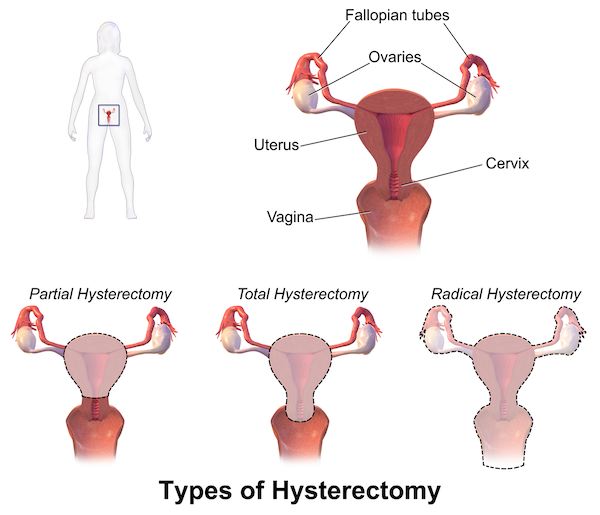
Hysterectomies are a very common procedure, so much so that it is the 2nd most frequently performed procedure for women in the United States that are of reproductive age. It is estimated that over 600,000 hysterectomies are performed every year. While the procedure is quite common, and some pain is inevitable, lost-lasting and debilitating pain is not. At Pelvic Rehabilitation Medicine, we treat patients with pain in and around the pelvic area, which can be caused by many different reasons. Many female patients come to us with concerns about pain after a hysterectomy.
Stop Living In Pain; contact Us Today
How long is it normal to have pain after a hysterectomy?
This can certainly vary based on each person and situation but we give a general timeframe of 3 months. A hysterectomy is an invasive surgery so it naturally requires downtime and will come with some residual pain and discomfort. This will almost always extend a few weeks after the surgery but if you are still in extreme pain and discomfort at the 3-month mark we generally recommend to go see a specialist.
This is not to say that you are experiencing abnormal pain in a shorter or longer time period. We have many patients that come to us 6, 8, 10, 12 months or several years after still experiencing pain after a hysterectomy. These longer time periods are most often needed medical attention. We use the 3-month mark as a guideline because the earlier we can identify and help treat this pain the quicker and easier it will be to get relief. If you are experiencing pain for years that compression and tightness will take longer to unfold compared to someone 3 months removed from surgery.
ARE SHARP AND CHRONIC PAINS NORMAL AFTER A HYSTERECTOMY?
Sharp and chronic pains are certainly going to exist after someone goes through a hysterectomy. Similarly to the time frame we talked about with pain, in general, it is helpful to use 3 months as a measuring stick.
This should be monitored a little more closely than just general pain and discomfort though. If you are experiencing extreme pangs and sharp discomfort to the point it is limiting your daily function earlier than 3-month intervention may be necessary. There is no hardened rule or scale of pain that can be applied to all women so trust your instincts. There is no way around not feeling any pain after a hysterectomy but use these timelines and your own bodily understanding as a guide.
WHY DO MY HIPS HURT AFTER HYSTERECTOMY?
Often times patients are placed in the dorsal lithotomy position for this surgery and this could potentially put stress on the hip joints. In addition, patients requiring a hysterectomy may have underlying pelvic floor muscle spasm which can cause pain to the hips and potentially concomitant pelvic girdle weakness which may cause compensatory overuse of muscles surrounding the hip joints.
WHERE CAN YOU EXPERIENCE PAIN AFTER A HYSTERECTOMY?
This is it not an exhaustive list but the most common areas that women feel pain after a hysterectomy.
- Back Pain
- Cramps/Ovary Pain
- Stomach Pain
- Leg Pain
- Bowel Pain
- Bladder/Burning Pain/Urgency/Frequency
- Pain with Intercourse
- Constipation/Pain with Bowel Movements
PAIN AFTER LAPAROSCOPIC / ROBOTIC HYSTERECTOMY
While the approaches and types of surgery are different, the pain is not. Both laparoscopic and robotic hysterectomies can cause scar tissue that can restrict fascia and decrease blood flow to muscles and nerves. This is especially true in the pelvic, stomach and lower back regions.
RISK FACTORS LEADING TO PAIN AFTER A HYSTERECTOMY
- Lack of Mobility
- Improper Procedure
- Sensitive Nerves Scar Tissue
- History of PF Hypertonia
- Core Weakness
WHY DO I FEEL BLOATED AND HAVE BELLY BUTTON PAIN AFTER A HYSTERECTOMY?
The bloated sensation can come within the first month post-op and may be due to the insufflation of the abdomen (air placed in the abdomen to help the surgeon see) required for the surgery. Belly button pain may be referred pain from pelvic floor spasms or the organs of the pelvis, it may also occur if the surgeon placed a port through the belly button to access your abdomen. Belly button pain can be normal post-operative healing and is normal up to 3 months post op.
WHAT CAN PAIN AFTER A HYSTERECTOMY MEAN?
A hysterectomy may lead to secondary pelvic floor muscle spasms/hypertonia and the scar tissue secondary to the surgery may lead to restricted fascia and ultimately decreased mobility of the fascia as well as decrease blood to the local nerves and muscles.
HOW DO I TREAT PAIN AFTER A HYSTERECTOMY?
Pelvic floor physical therapy to help mobilize scar tissue as well as visceral mobilization and nerve gliding to help improve mobility and blood flow. Pelvic floor physical therapy in combination with our unique protocol can help to promote blood flow, decrease muscle tension in the pelvic floor and desensitize the overactive nerves that can cause persistent pain after a hysterectomy. Our unique approach to pain and tightness in the pelvic region is centered around the use of trigger point injections to create “space”.
If you are experiencing pain after a hysterectomy and are concerned that it is unnatural or been an extended period of time please reach out to our office to schedule a consultation.
